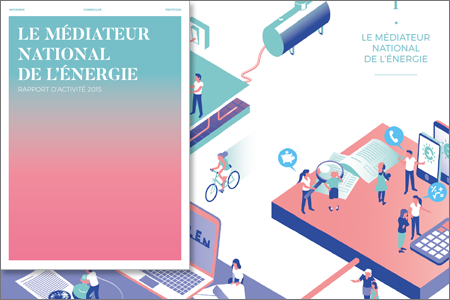During the presentation of its 2015 annual report, the French National Energy Ombudsman, Jean Gaubert, reviewed the changes that have impacted the activities of this public institution, in particular, the development of competition in electricity and natural gas markets, and progress made through reforms in the energy sector, and in alternative dispute resolution (mediation) for consumers.
In 2015, competition increased in electricity and gas markets, with a “mandatory” opening for the biggest consumers, affected by the end of regulated tariffs, but also “chosen” for residential consumers, more likely to switch energy supplier.
As part of its statutory tasks, the Ombudsman participated in providing better information to all energy consumers. In 2015, the service informed 1.9 million of them through its corporate website (energie-mediateur.fr) and through its information service Energy-Info, either through the call center (free number) or the energie-info.fr website, on which it is possible to compare all the electricity and natural gas supply offers, and to get a free, neutral, and independent from energy suppliers information.
Regarding the disputes received by the National Energy Ombudsman, the number (12,319) decreased by 15% compared to 2014. According to Jean Gaubert, it demonstrates that “the work carried out with market operators, in connection with public powers, bears fruit over time to the benefit of all.”
The decrease in the number of disputes the Ombudsman received is also due to the mild winter climate in 2014-2015, which helped to reduce the number of energy bills and to lower down disputes related to their amount. Accordingly, unpaid and cuts or supply limitations are down by 7.4% compared to 2014 (577,000 interventions for unpaid bills implemented in 2015).
It should also be noted that the energy transition law, published in August 2015, extended the terms of the Ombudsman to domestic fuel consumption, wood, LPG, and heating networks, but only a fraction of consumers turned to the service for help on these subjects, probably due to insufficient information provided by some suppliers about the possibility to use alternative dispute resolution.
In the electricity and natural gas sectors, the Ombudsman observed two contrasting phenomena in 2015:
– The acceleration of business development in the French market for new suppliers (ENI, Lampiris…) was accompanied by a resurgence of “simple” disputes, related to the failures of information systems and customer management procedures undersized to cope with a rapid increase in their client portfolios.
This phenomenon, which began in late 2014, contrasts with the relative maturity of incumbent suppliers (EDF, Engie, or Direct Energie) for whom the litigation rate is decreasing every year.
It should be stressed, however, that ENI has been proactive to restore an even situation for its clients, by implementing actions that have begun to bear fruit since the last quarter of 2015.
– The persistence of more complex disputes, with significant financial issues (which may represent several thousand or tens of thousands of euros), which concern mainly the clients of incumbent suppliers, or which originate in some bad ongoing practices of the public electricity DSO ERDF (now Enedis).
“Stuck between a not so exemplary public service, new entrants aggressive on price but for whom the customer service is not the priority, and operators who do not let go on billing corrections until the law does not require it, consumers need more than ever a truly independent third party to obtain clear information and effective assistance”, according to Jean Gaubert.
In the future, the reforms supported by the Ombudsman and voted by the Parliament in 2015 will undoubtedly change the landscape of energy consumption and thus the activity of this public institution. This will be the case, for example, for the ban on billing corrections of more than 14 months, which is to come into force on 19 August 2016 and should reduce consumer payment difficulties and therefore the number of disputes; or the energy check, the first of them having been distributed in late May 2016 in the four departments of the experiment. This is an important step for the most vulnerable households, and the Ombudsman would like it to be strengthened and generalized.
The Ombudsman also welcomes that the government and the members of Parliament have initiated a reform on energy taxation and in particular the contribution to the electricity public service, essential to finance the energy transition.
Finally, the spread of alternative dispute resolution schemes in all sectors of consumption should help to develop the culture and quality of mediation in France, also strongly encouraged by the reforms in the Justice sector.
Click here to see the 2015 annual report in English.
Key figures 2015:
1.9 million consumers informed through the websites and free number
12,319 disputes were received by the National Energy Ombudsman
2,910 solution recommendations
93% of consumers willing to recommend the Ombudsman

